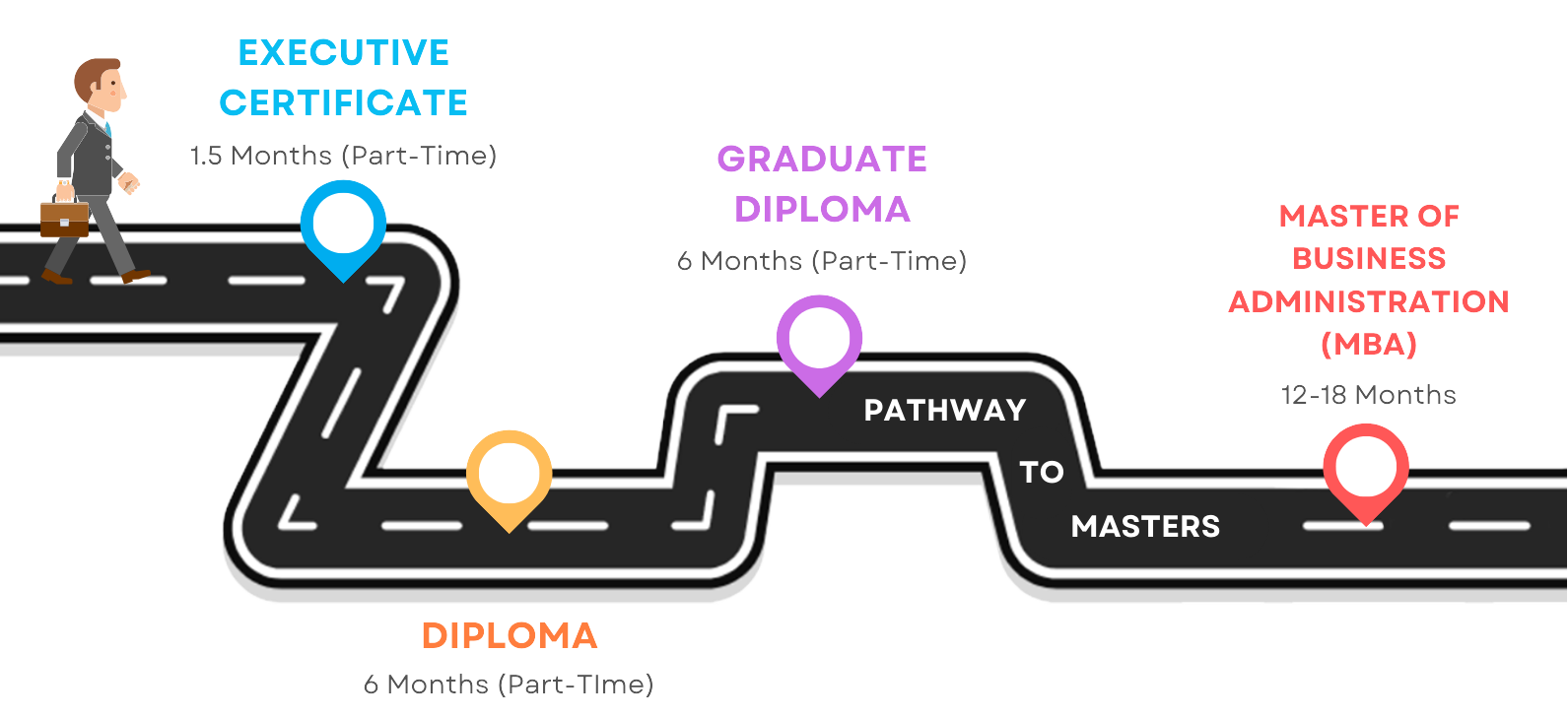Pathway to MBA (Master of Business Administration) & MSc (Master of Science)
The SIPMM Leadership Level Qualification (Graduate Diploma) is recognised as an articulation pathway that enables learners to progress to the following MBA degree programmes:
- Master of Business Administration (MBA), Awarded by University of Sunderland, 12-18 months part-time
The list of Leadership Level Qualifications which are recognised for progression into an MBA degree programme include:
Progression and Timeline to MBA & MSc

A Master of Business Administration (MBA) is a graduate degree that focuses on business administration and management. Different business schools and types of MBA programmes offer their assortment of advanced modules in subjects such as banking, accounting, marketing, project management, supply chain management, human resource management and leadership.

SIPMM Qualification Programmes
SIPMM offers specialised Qualifications at 3 professional levels: the Leadership Level (Graduate Diploma), Managerial Level (Diploma / Specialist Diploma) and the Foundation Level (Executive Certificate).
These qualifications are designed and developed by industry experts to provide Logistics, Procurement, and Supply Chain professionals with the industry knowledge and skills they need to succeed in today’s modern organisations.
What is an MBA?
A Master of Business Administration (MBA) is a graduate degree that focuses on business administration and management. It is also known as a Master’s in Business Administration. MBA is an advanced course of study designed to equip individuals with the necessary skills, knowledge and experience required to take on managerial or senior leadership positions at their respective organisations. It involves studying the theory and application of business, as well as various management principles.
Different business schools and types of MBA programmes offer their assortment of advanced modules in subjects such as banking, accounting, marketing, project management, supply chain management, human resource management and leadership.
Who is an MBA degree for?
An MBA degree enables students to have a wide range of career opportunities. While historically most MBA students pursued jobs in finance and consulting, the average MBA student today hails from a wide variety of professional backgrounds, with many exploring careers in fields as diverse as logistics or supply chain.
According to a recent survey from the Graduate Management Admission Council, the top career motivations for prospective MBA students include: increase salary, promotion to senior positions, managing people, and working internationally. These benefits are just some of the many reasons to get an MBA degree.
Whether you come from a procurement, management, or operations background, the MBA is a great place to learn the skills you need to advance your career and explore opportunities that may be outside of your current skill set. The MBA provides an excellent opportunity for networking with other professionals and can be used as a springboard for starting your own business, progressing within your organisation, or switching function, industry, location, or all of the three concurrently.
How does an MBA benefit you?
MBA graduates have a competitive edge over other job seekers and are touted as having the potential to rise quickly in the ranks of any company with strong management. They are also given special consideration by employers as they tend to have a high degree of technical know-how, strong business acumen, and leadership qualities that make them an ideal candidate for many companies.
The skills acquired from studying an MBA are advantageous to many in the workforce, leading to the ability to lead organisations and manage internal and external resources. Ultimately, these skills can help one become a successful leader who can effectively lead others.
How can you get into an MBA degree programme?
At SIPMM, progression pathways into the MBA degree programme are available for graduates of the SIPMM Leadership Qualification programmes. SIPMM Graduate Diploma holders can gain entry into the following MBA degree programmes:
- Master of Business Administration (MBA), Awarded by University of Sunderland, 12-18 months part-time
- MSc. Supply Chain Management and Global Logistics, Awarded by University of London, 12 months part-time
- MSc. International Business and Management, Awarded by University of Suffolk, 12-18 months part-time
Modules exemption are available. Interested students may contact SIPMM at [email protected].
